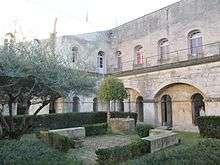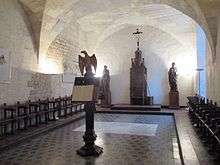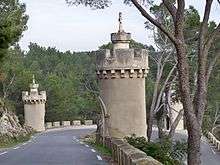Frigolet Abbey
.jpg)
.jpg)



Frigolet Abbey (Abbaye Saint-Michel de Frigolet) is a Premonstratensian monastery, originally Benedictine, in southern France. It is located in the territory of the commune of Tarascon, in the region of the Montagnette, the parishes of which are served by the canons of the monastery.
Monks, canons and friars
The monastery, dedicated to Saint Michael, was founded about 960 at Frigolet by Conrad the Pacific, King of Arles, on one of the numerous hills which lie between Tarascon and Avignon. It was initially occupied by Benedictine monks from Montmajour Abbey.
By the 12th century, the abbey was home to a community of canons regular. A document from 1133 lists the prior of the canons as Guillaume of Loubières. The chapel of Our Lady of Good Remedy dates from this period. The canonical Augustinian community lasted until 1480, when the canons petitioned the Holy See to suppress the monastery. This request was granted by Pope Sixtus IV, at which time the monastery was abandoned. The chapel, however, remained a popular pilgrimage site.<ref name=SMF /[1]
In 1647 the monks of the Hieronymite Order were given possession of the derelict monastery. They worked to restore it, at the same time expanding the complex, enlarging the choir and sacristy, and erecting a chapter room. The community did not stay long, however, and were replaced in 1661 by the Discalced Augustinians. The friars of this order continued the work of the Hieronymites, but also did pastoral care in the surrounding region, providing support to the local clergy.[2]
At the time of the French Revolution, it was suppressed and sold by the French Republic.
Premonstratensians: 19th century to the present
From that time it changed hands frequently, eventually acquired by a priest, the Abbé Edmund Boulbon who purchased it from another priest, T. Delestrac. Boulbon, born 14 January 1817, entered the Abbey of Our Lady of La Trappe at Bricquebec in 1850, wishing to lead a more dedicated religious life. Acting on the advice of the Trappist superiors, he left the abbey and undertook the restoration of the Premonstratensian Order, or Order of St. Norbert.
On 6 June, the feast day of St. Norbert, Boulbon received the white habit of the Premonstratensians from the hands of Paul-Armand de Cardon de Garsignies, Bishop of Soissons, at Prémontré Abbey. Pope Pius IX approved the project in an audience which he granted him on 4 December 1856.
With the consent of Georges-Claude-Louis-Pie Chalandon, Archbishop of Aix, Boulbon took possession of Frigolet and, having admitted several novices, commenced community life there. In honour of Our Lady Conceived without Sin he erected a magnificent church, which was solemnly consecrated on 6 October 1866. The monastery was canonically erected as a priory on 28 August 1868, and as an abbey in September 1869, with Boulbon as its first abbot.
On 8 November 1880, under the French anti-clerical laws, the Abbey of Frigolet was seized and the religious expelled. Eventually, however, they were permitted to return.
Boulbon died on 2 March 1883. His successor, Paulinus Boniface, named abbot on 10 June 1883, undid by poor administration the work begun by Boulbon; but, after a canonical visitation by François Xavier Gouthe-Soulard, Archbishop of Aix, he was deposed, and the direction of the abbey entrusted to Denis Bonnefoy. Up to this time, Frigolet Abbey with the priories it had founded had formed, as it were, a separate congregation with an organization of its own, having no connection with the other abbeys or the General Chapter of the Premonstratensian Order. This state of affairs was changed by a decree of the Sacred Congregation of Bishops and Regulars, dated 17 September 1898, when the congregation of Frigolet was incorporated into the Order.
Denis Bonnefoy, who was made abbot on 21 March 1899, died on 20 September of the same year. The canons of Frigolet then chose for their abbot Godfrey Madelaine, then prior of Mondaye Abbey, Calvados, the author of L'histoire de S. Norbert and other books. Under his administration, Frigolet Abbey sent missionaries to Madagascar, and founded priories at Conques and Etoile in France, and at Storrington and Bedworth in England.[3] Meanwhile, the French Republic had framed new laws against all religious institutes, and on 5 April 1903, the canons, again expelled from their abbey, took refuge either in Belgium, in Norbertine abbey in Leffe, or in the priory at Storrington in England.
The community at Leffe suffered severely from the German occupation during World War I: some were killed, and the rest were driven into further exile. Frigolet was reoccupied by the Premonstratensians in 1923, and remains in operation, although the communities at Leffe and Storrington also continued.
The Abbot of Frigolet from 1946 was P. Norbert Calmels, later distinguished as the Abbot-General of the Premonstratensian Order from 1961 to 1981, during which time he participated in Vatican II.
Under Pope John Paul II the abbey church of Frigolet was raised to the status of a minor basilica.
Notes
- ↑ "History". Abbeye Saint-Michel de Frigolet. Retrieved 17 February 2013.
- ↑
- ↑ http://www.newadvent.org/cathen/12387b.htm
References
- Attribution
 This article incorporates text from a publication now in the public domain: Herbermann, Charles, ed. (1913). "Abbey of Frigolet". Catholic Encyclopedia. New York: Robert Appleton.
This article incorporates text from a publication now in the public domain: Herbermann, Charles, ed. (1913). "Abbey of Frigolet". Catholic Encyclopedia. New York: Robert Appleton.
External links
| Wikimedia Commons has media related to Frigolet Abbey. |
Coordinates: 43°51′30″N 4°43′39″E / 43.8583°N 4.7276°E